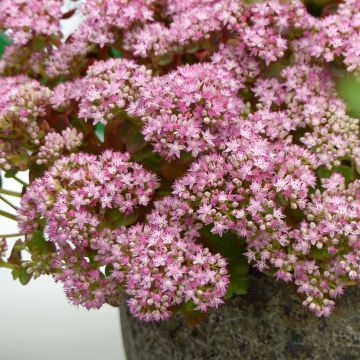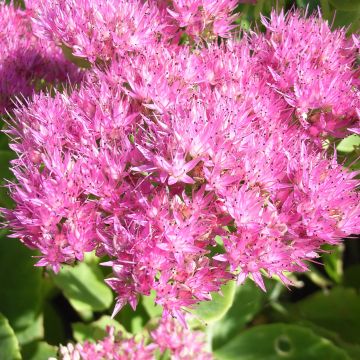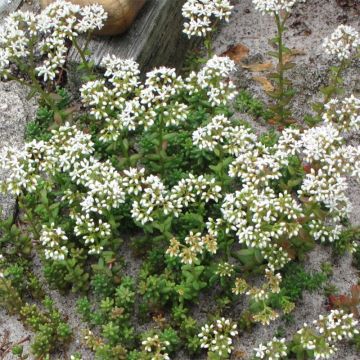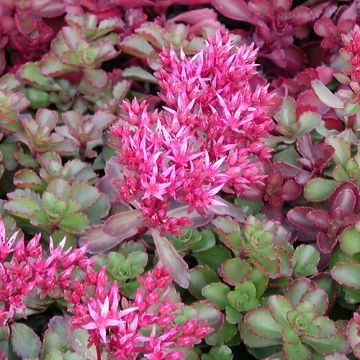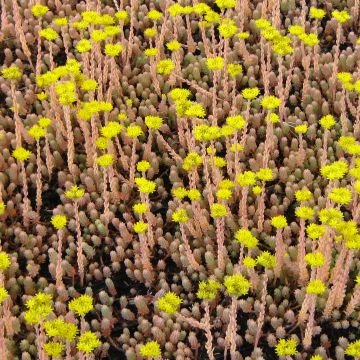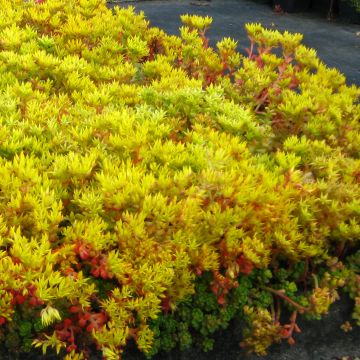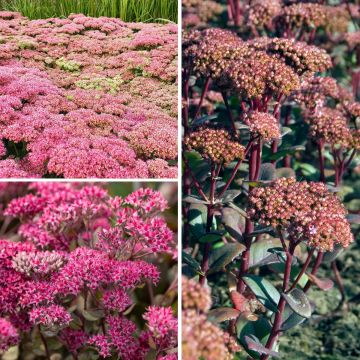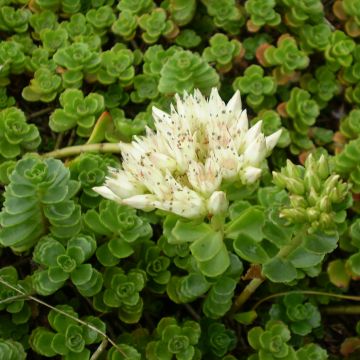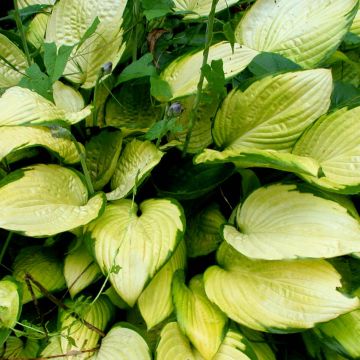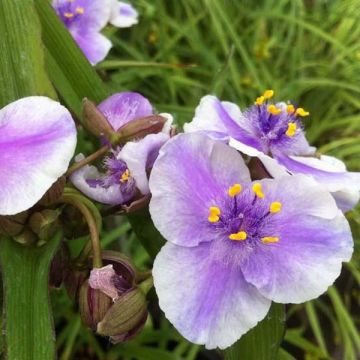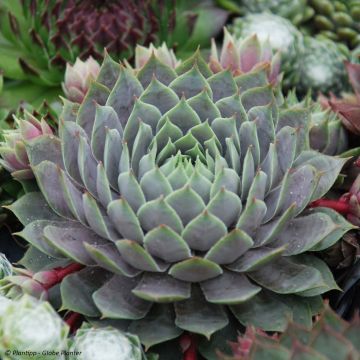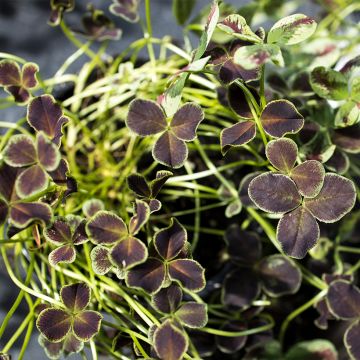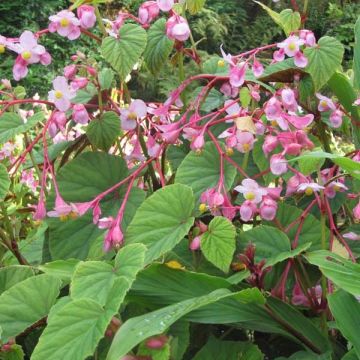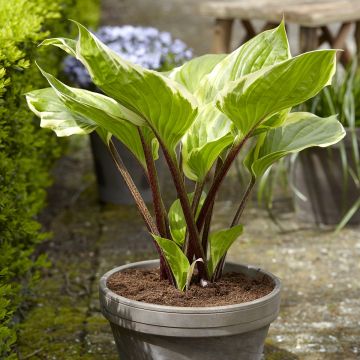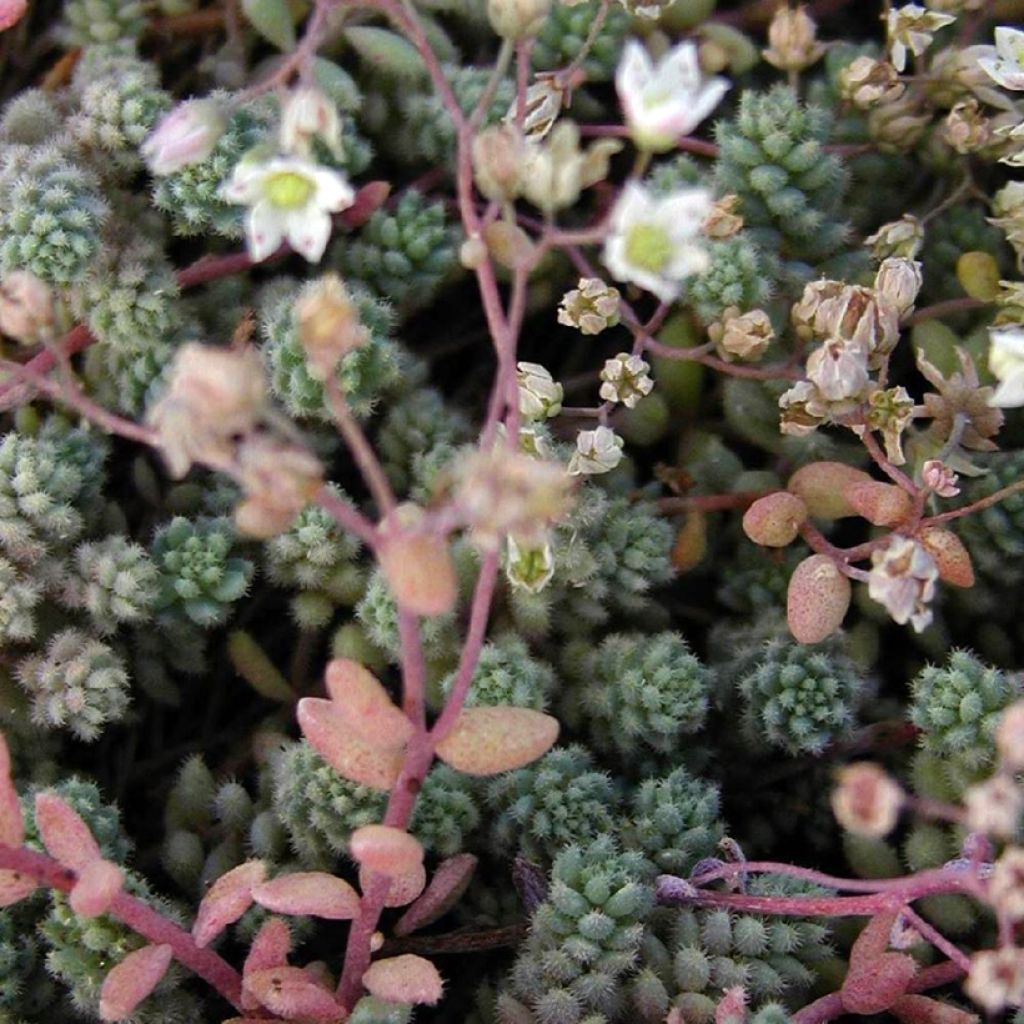

Sedum cyaneum Rose Carpet - Azure stonecrop
Sedum cyaneum Rose Carpet - Azure stonecrop
Sedum cyaneum Rosenteppich (Rose Carpet)
Azure stonecrop
This item cannot be shipped to the selected country
Delivery charge from €5.90
More information
Schedule delivery date,
and select date in basket
This plant carries a 12 months recovery warranty
More information
We guarantee the quality of our plants for a full growing cycle, and will replace at our expense any plant that fails to recover under normal climatic and planting conditions.
From €5.90 for pickup delivery and €6.90 for home delivery
Express home delivery from €8.90.
Does this plant fit my garden?
Set up your Plantfit profile →
Description
Sedum 'Rosenteppich', also known as 'Rose Carpet', is a semi-evergreen Sakhalin Stonecrop with grey-green foliage and abundant summer flowering in pink. Its stems bear tiny fleshy leaves and its growth forms very dense cushions that work well in rock gardens or in containers. Planted in groups, this small perennial forms very decorative ground covers for most of the year. A good plant for dry, shallow soils, always in full sun.
Sedum 'Rose Carpet' is a horticultural selection. This very hardy perennial belongs to the Crassulaceae family. It forms a compact, semi-spreading, 10-15 cm tall tuft, slowly reaching a spread of 30 cm. Its fleshy stems bear multiple small succulent round leaves, tightly arranged in rosettes. This foliage persists more or less in winter and may disappear in very cold climates. It is glaucous to grey-blue. In summer, under intense sun and heat, the leaves can take on a pink blush. Cold temperatures can also have the same effect on leaf colour. The more sun the plant receives and the poorer the soil, the more compact, thick, and colourful it will be. This selection has particularly abundant flowering. When it blooms, from July to August, it takes the form of numerous umbels that cover the foliage. These umbels are composed of a multitude of tiny pink flowers that attract many pollinators.
Stonecrops or Sedums are proof that poor soil can also offer beautiful specimens with subtle shades. If your soil is not rich, rather dry, even rocky or limestone, you can still benefit from these hardy perennials (they withstand temperatures below -15°C), which require no maintenance and promise to bring life to the garden with visits from butterflies. These succulents are easy to grow and have flowers and foliage in various colours that can be used to create multiple palettes, whether in flower beds, containers, or rock gardens. However, if you have rich, moist, and heavy substrates, you can also have them. They will thrive without any problem if you add gravel or stones. They should not be exposed to excessive moisture in winter or be covered with dead leaves, as this could cause them to wither.
This non-invasive 'Rose Carpet' Stonecrop is valuable for adding colour to all sunny corners: along pathways, at the edge of a terrace, above a wall, in a rock garden, in pots. It easily blends with all rock garden perennials, requires no special care and adds a very architectural touch to arid slopes. It will also form a bright foreground that catches the eye under evergreen hedges (south-facing exposure), where the soil is often poor, light, and dry. Create a beautiful scene by planting it with 'Red Carpet' Thyme and 'Kent Beauty' Oregano.
Report an error about the product description
Sedum cyaneum Rose Carpet - Azure stonecrop in pictures
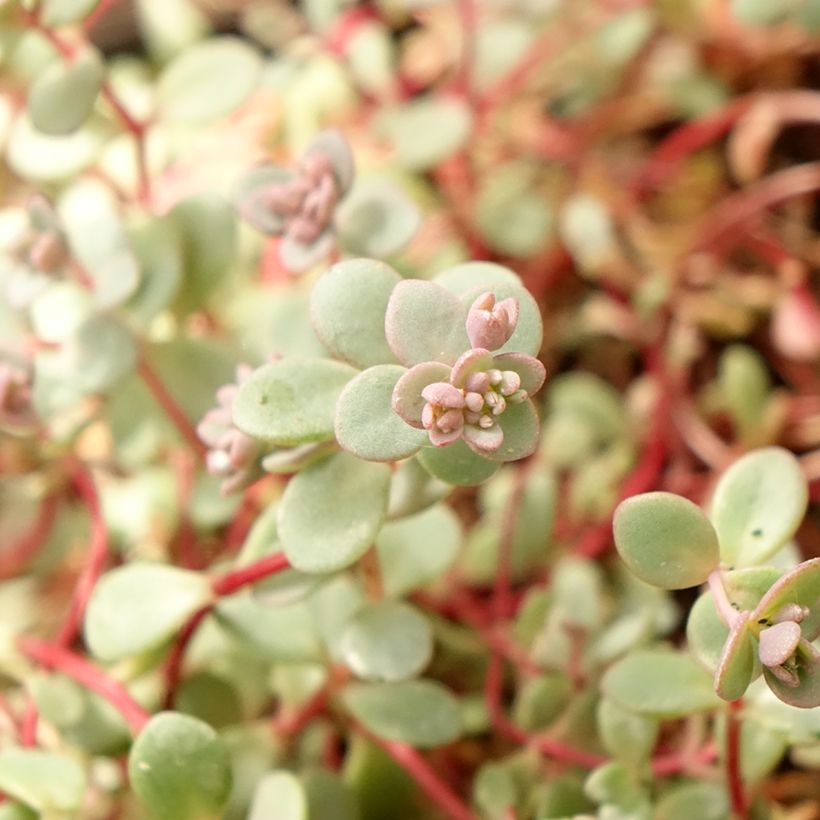

Flowering
Foliage
Plant habit
Botanical data
Sedum
cyaneum
Rosenteppich (Rose Carpet)
Crassulaceae
Azure stonecrop
Cultivar or hybrid
Other Sedum
Planting and care
Sedum Rose Carpet thrives in very sunny exposures as well as well-drained, rocky, and poor soils. Once well established, it withstands drought well. You can plant it in the ground or in a container in spring or autumn. Make sure to use a highly-drained substrate and add some gravel if necessary. Conversely, if you place it in a rockery or on a wall, just give it a little potting soil to allow it to establish, and then it will manage on its own.
Care for it by ensuring that it does not get covered with dead leaves or vegetation residues and by removing any faded inflorescences if necessary. Potted plants should be watered regularly between spring and late summer.
Planting period
Intended location
Care
This item has not been reviewed yet - be the first to leave a review about it.
Coloured foliage perennials
Haven't found what you were looking for?
Hardiness is the lowest winter temperature a plant can endure without suffering serious damage or even dying. However, hardiness is affected by location (a sheltered area, such as a patio), protection (winter cover) and soil type (hardiness is improved by well-drained soil).

Photo Sharing Terms & Conditions
In order to encourage gardeners to interact and share their experiences, Promesse de fleurs offers various media enabling content to be uploaded onto its Site - in particular via the ‘Photo sharing’ module.
The User agrees to refrain from:
- Posting any content that is illegal, prejudicial, insulting, racist, inciteful to hatred, revisionist, contrary to public decency, that infringes on privacy or on the privacy rights of third parties, in particular the publicity rights of persons and goods, intellectual property rights, or the right to privacy.
- Submitting content on behalf of a third party;
- Impersonate the identity of a third party and/or publish any personal information about a third party;
In general, the User undertakes to refrain from any unethical behaviour.
All Content (in particular text, comments, files, images, photos, videos, creative works, etc.), which may be subject to property or intellectual property rights, image or other private rights, shall remain the property of the User, subject to the limited rights granted by the terms of the licence granted by Promesse de fleurs as stated below. Users are at liberty to publish or not to publish such Content on the Site, notably via the ‘Photo Sharing’ facility, and accept that this Content shall be made public and freely accessible, notably on the Internet.
Users further acknowledge, undertake to have ,and guarantee that they hold all necessary rights and permissions to publish such material on the Site, in particular with regard to the legislation in force pertaining to any privacy, property, intellectual property, image, or contractual rights, or rights of any other nature. By publishing such Content on the Site, Users acknowledge accepting full liability as publishers of the Content within the meaning of the law, and grant Promesse de fleurs, free of charge, an inclusive, worldwide licence for the said Content for the entire duration of its publication, including all reproduction, representation, up/downloading, displaying, performing, transmission, and storage rights.
Users also grant permission for their name to be linked to the Content and accept that this link may not always be made available.
By engaging in posting material, Users consent to their Content becoming automatically accessible on the Internet, in particular on other sites and/or blogs and/or web pages of the Promesse de fleurs site, including in particular social pages and the Promesse de fleurs catalogue.
Users may secure the removal of entrusted content free of charge by issuing a simple request via our contact form.
The flowering period indicated on our website applies to countries and regions located in USDA zone 8 (France, the United Kingdom, Ireland, the Netherlands, etc.)
It will vary according to where you live:
- In zones 9 to 10 (Italy, Spain, Greece, etc.), flowering will occur about 2 to 4 weeks earlier.
- In zones 6 to 7 (Germany, Poland, Slovenia, and lower mountainous regions), flowering will be delayed by 2 to 3 weeks.
- In zone 5 (Central Europe, Scandinavia), blooming will be delayed by 3 to 5 weeks.
In temperate climates, pruning of spring-flowering shrubs (forsythia, spireas, etc.) should be done just after flowering.
Pruning of summer-flowering shrubs (Indian Lilac, Perovskia, etc.) can be done in winter or spring.
In cold regions as well as with frost-sensitive plants, avoid pruning too early when severe frosts may still occur.
The planting period indicated on our website applies to countries and regions located in USDA zone 8 (France, United Kingdom, Ireland, Netherlands).
It will vary according to where you live:
- In Mediterranean zones (Marseille, Madrid, Milan, etc.), autumn and winter are the best planting periods.
- In continental zones (Strasbourg, Munich, Vienna, etc.), delay planting by 2 to 3 weeks in spring and bring it forward by 2 to 4 weeks in autumn.
- In mountainous regions (the Alps, Pyrenees, Carpathians, etc.), it is best to plant in late spring (May-June) or late summer (August-September).
The harvesting period indicated on our website applies to countries and regions in USDA zone 8 (France, England, Ireland, the Netherlands).
In colder areas (Scandinavia, Poland, Austria...) fruit and vegetable harvests are likely to be delayed by 3-4 weeks.
In warmer areas (Italy, Spain, Greece, etc.), harvesting will probably take place earlier, depending on weather conditions.
The sowing periods indicated on our website apply to countries and regions within USDA Zone 8 (France, UK, Ireland, Netherlands).
In colder areas (Scandinavia, Poland, Austria...), delay any outdoor sowing by 3-4 weeks, or sow under glass.
In warmer climes (Italy, Spain, Greece, etc.), bring outdoor sowing forward by a few weeks.

































